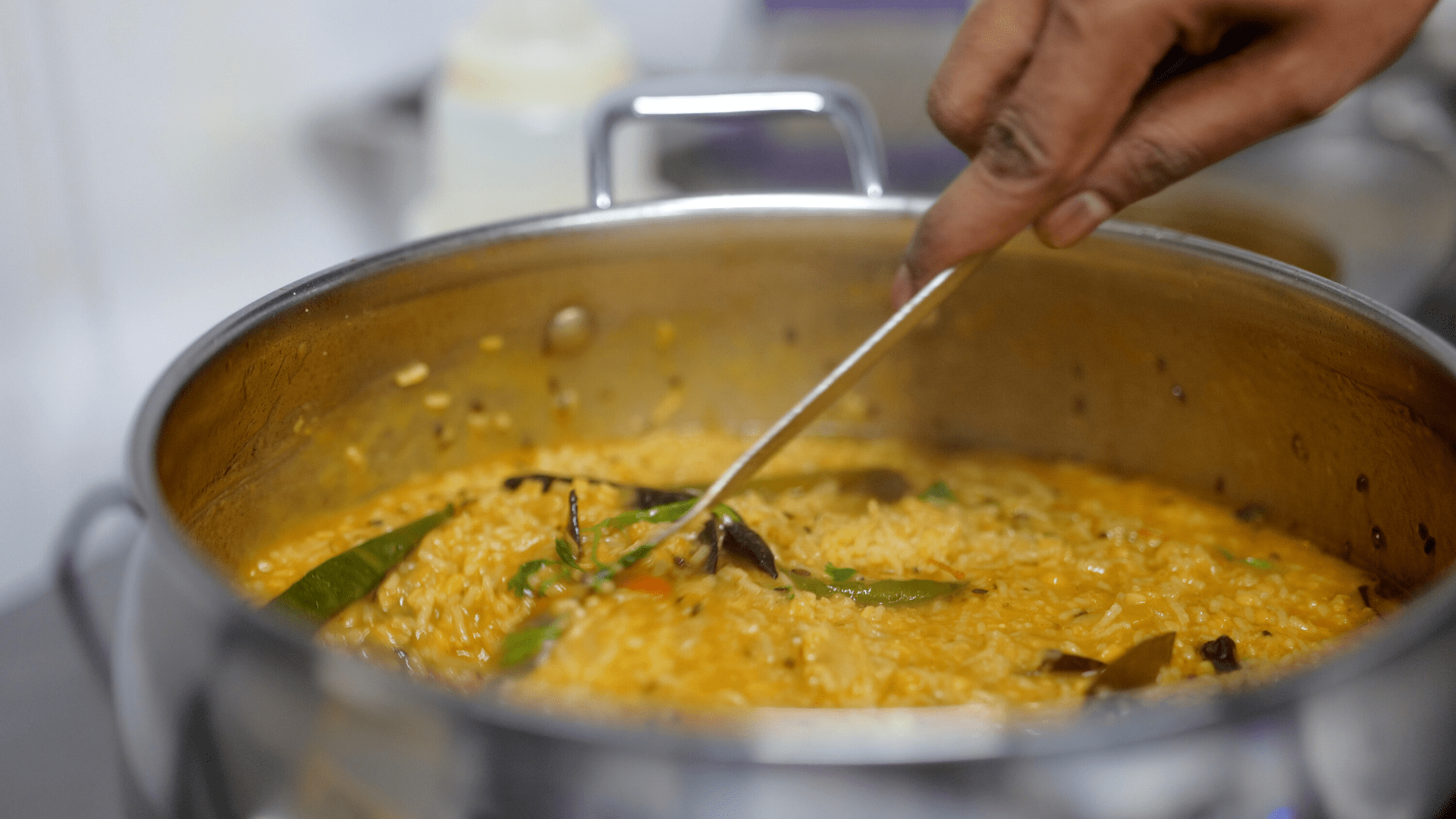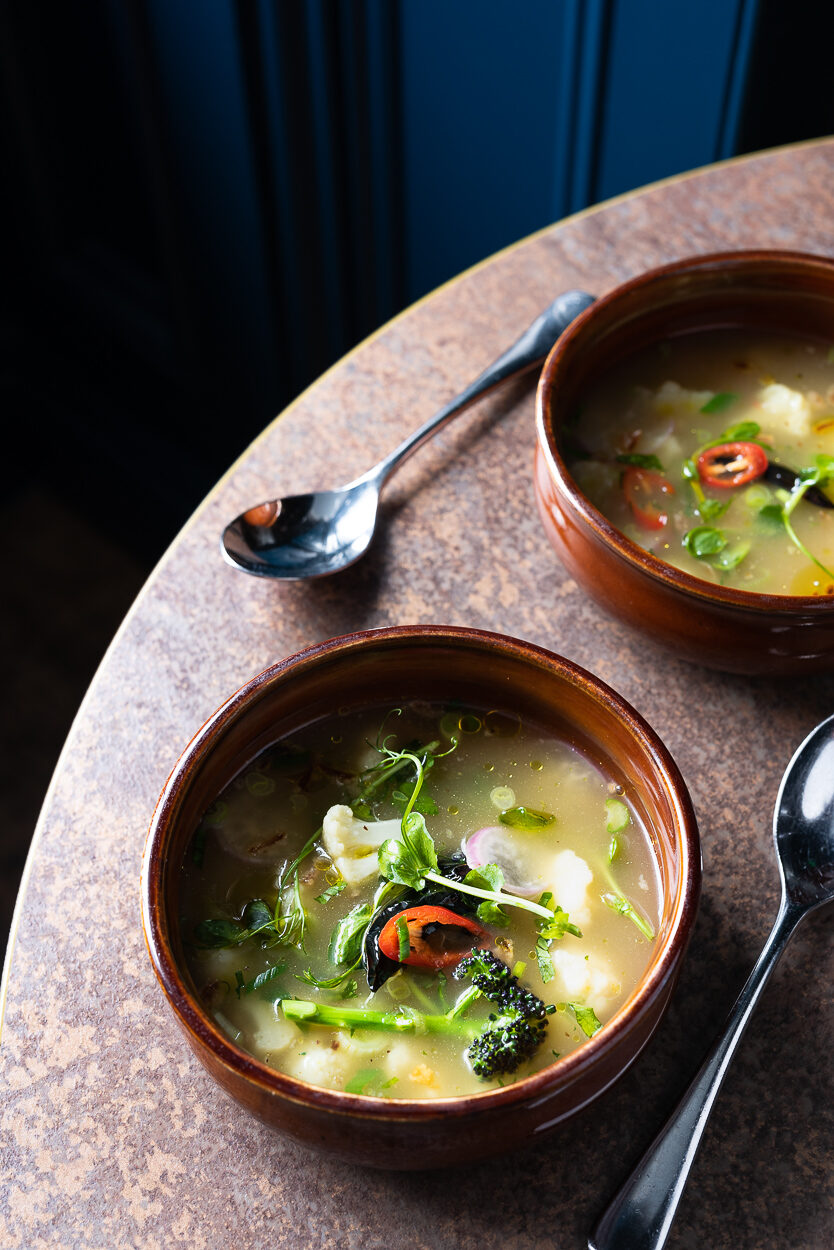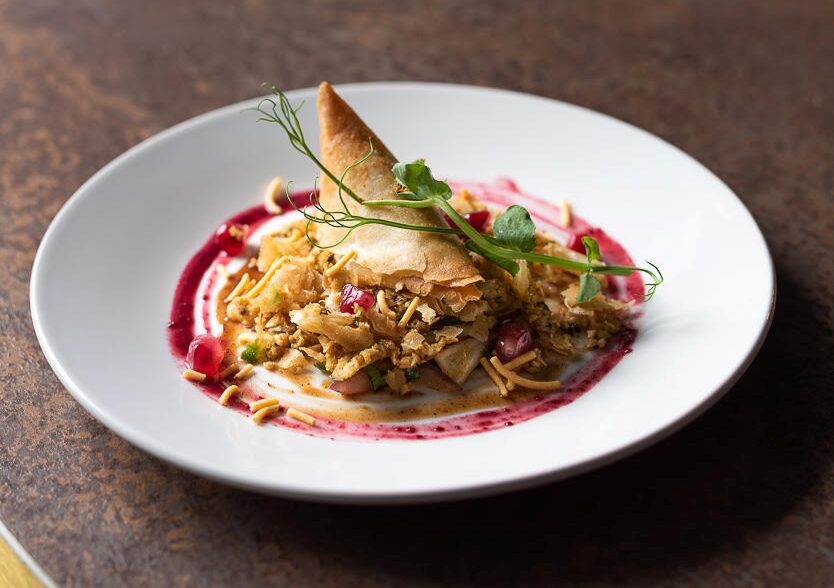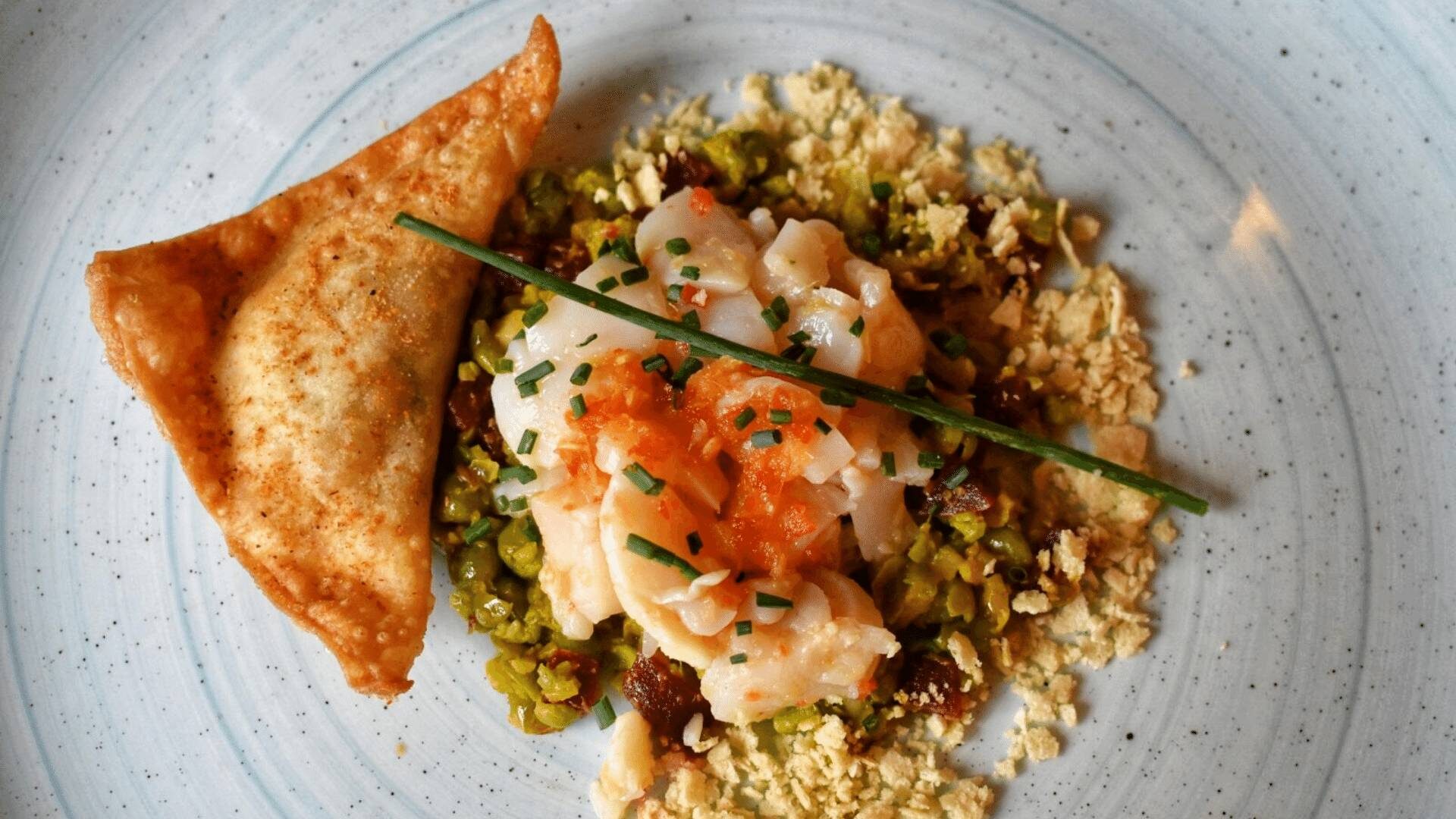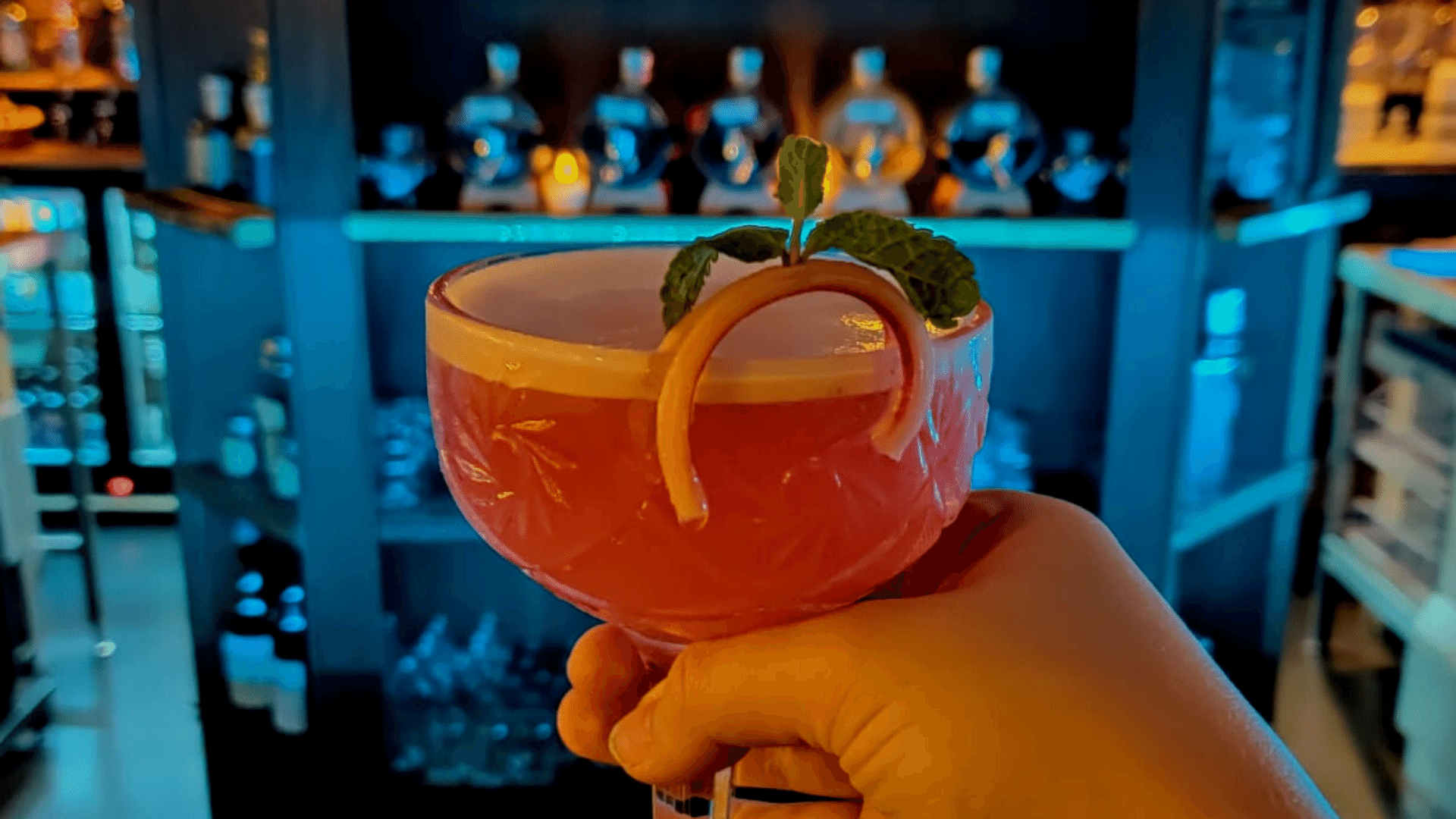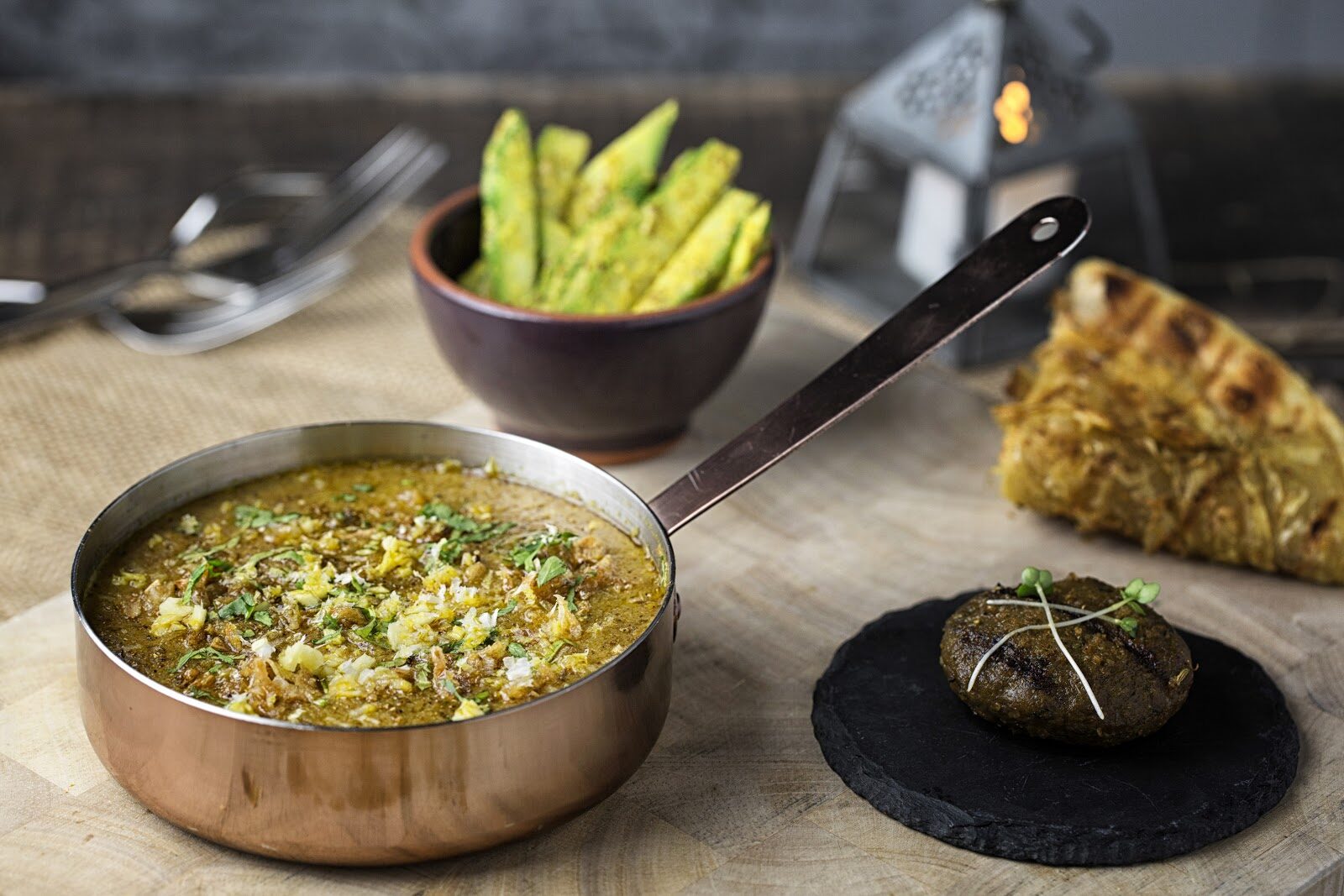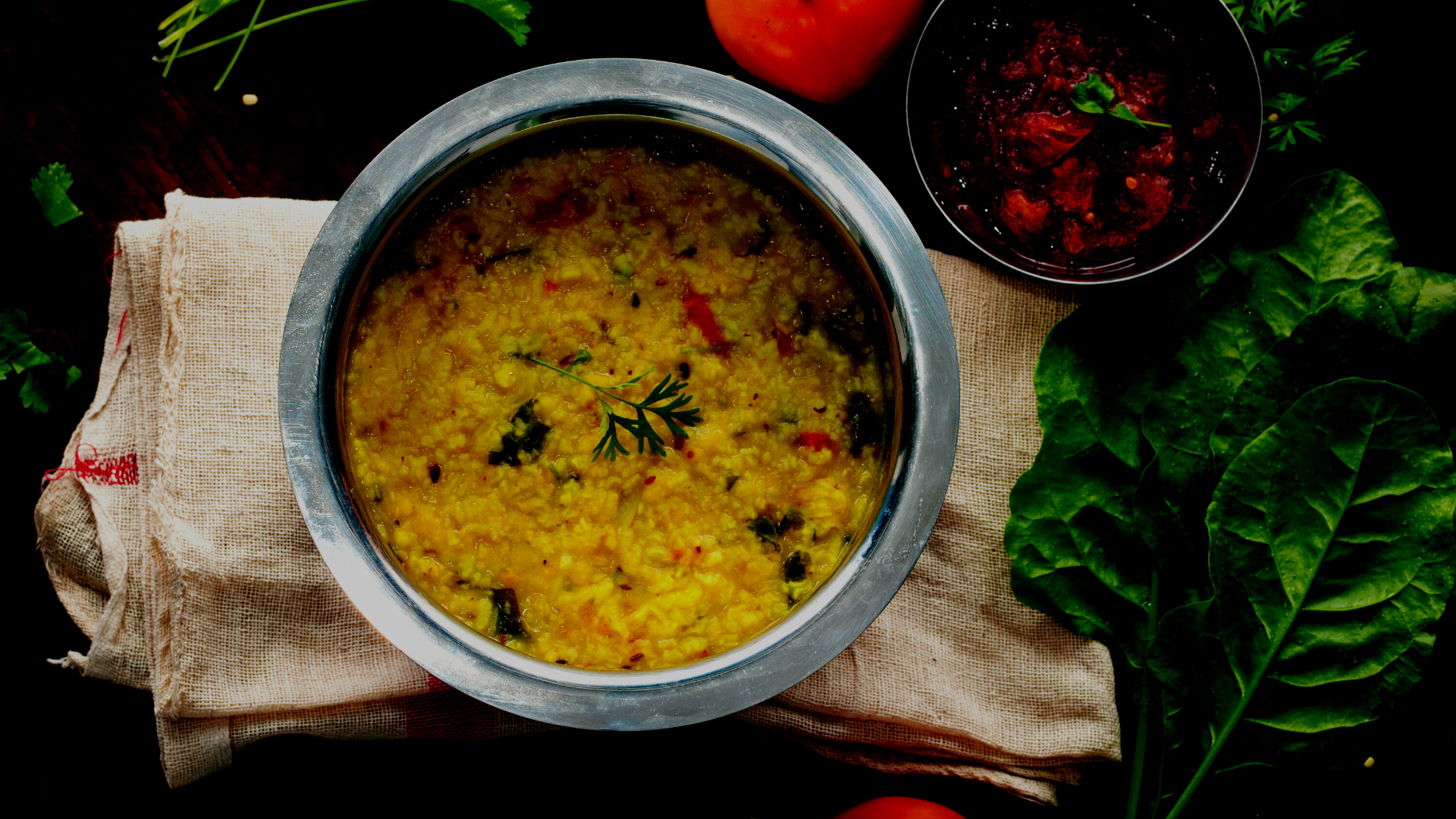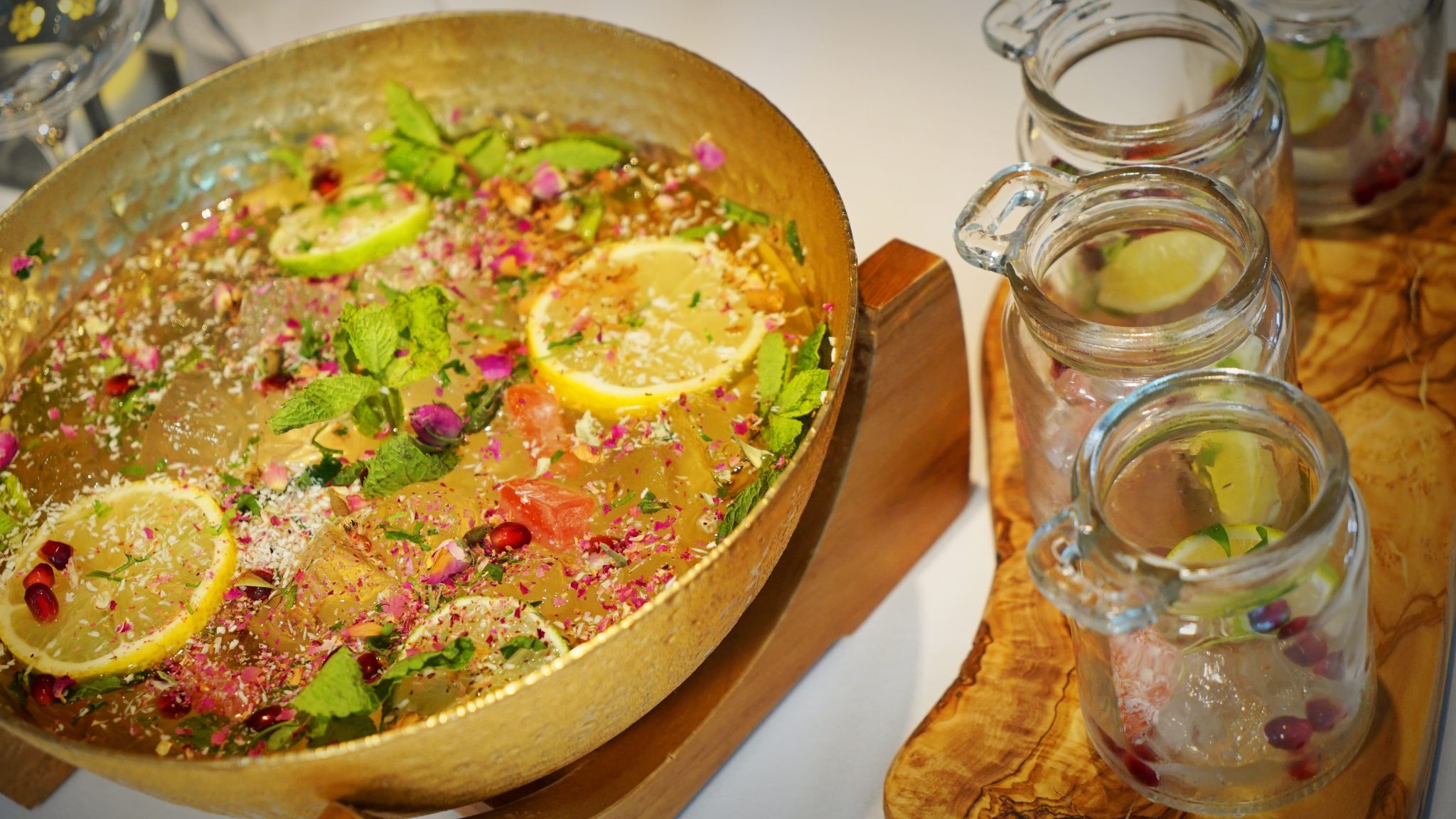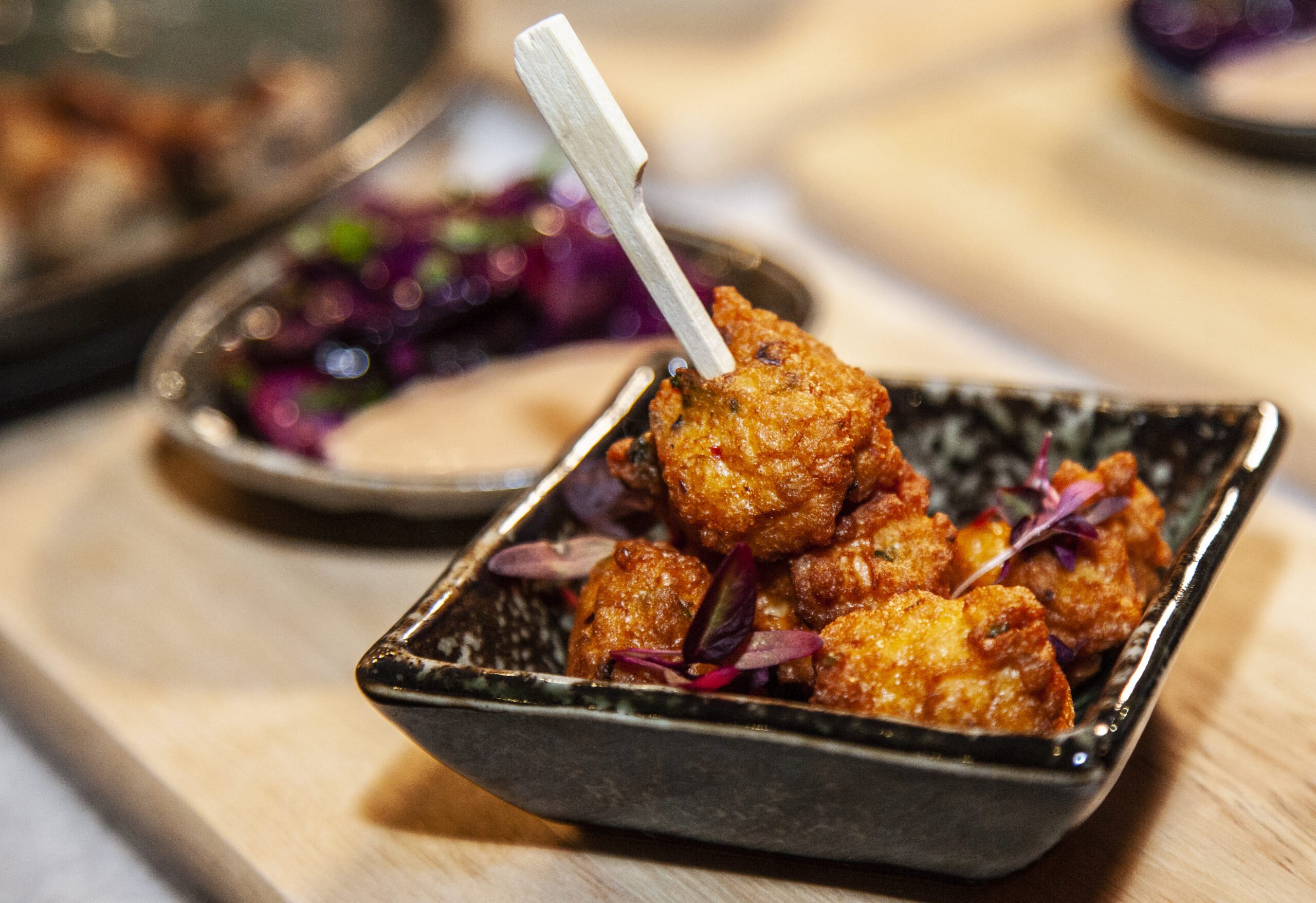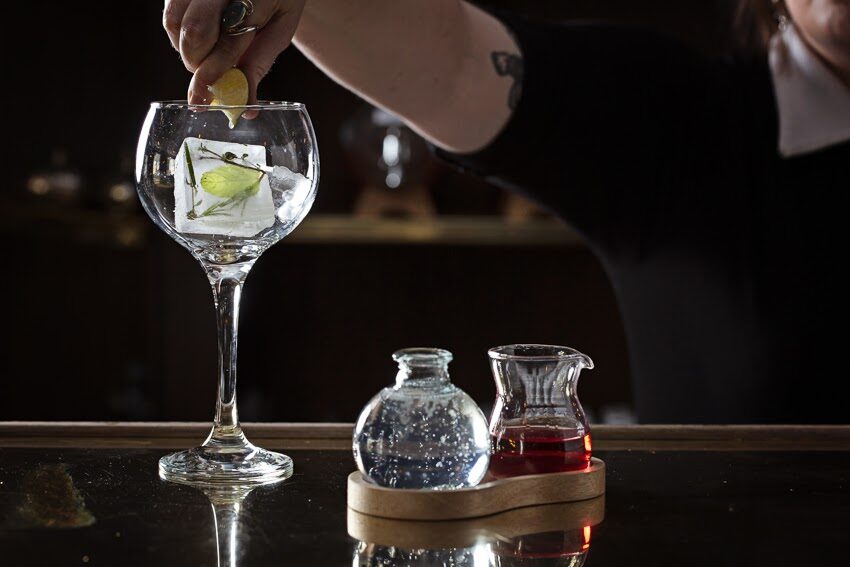Khichri
This is a south Asian specialty of rice and lentils served with an assortment of accompaniments.
No products in the cart.
A light and fragrant soup using seasonal vegetables and potatoes. Perfect for lunch or dinner starter during this hot summer
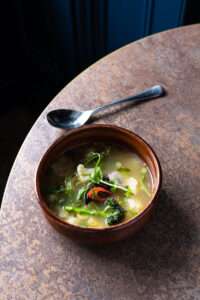
Season : Spring & Autumn
Course: Soup
Complexity: Easy
Prep time: 10-15 min
Ingredients
12 to 14 cauliflower florets
10 to 12 tenderstem broccoli
3 small jersey royal potato cubed
2 banana shallots chopped
2 Garlic cloves chopped
¼ tsp crushed fennel
½ tsp crushed cumin
1 green chilli (deseeded)
2 bay leaf
2 cloves
Salt to taste
Ingredients
6 Curry leaves
2 TBSP olive oil
1 tsp asafoetida
1.2 litre of vegetable stock
Garnish
1 tsp freshly crushed black pepper
Red chilli chopped
Spring onion chopped
1 TBSP Tamarind sauce /lime juice
Roasted sunflower seeds
Method
Steps:
Samosa Chaat is made when samosa is broken into bite-sized pieces and served with masala, chutney, and spices. Even though it’s amazing street food, it can also be made at home. It’s the perfect dish to experiment with because there are so many different sauces and spices to try it with!
Deconstructed samosa, mixed with spices and vegetables.
Season : all
Course: Appetiser
Complexity: Easy
Prep time: 20-25 min
Cooking time: 10-15 min Category: Veg/ Meat Serves: 4-6
Ingredients
To prepare samosa:
200g Filo pastry sheets
2 large potatoes
1 can of chickpeas
1 medium sized onion chopped
2 cloves of garlic finely chopped
1 tsp turmeric
2 tbsp vegetable oil
1 tbsp coriander seeds
1 tsp black mustard seeds
1 tsp Kashmiri chilli
1 beaten egg
Salt to taste
Oli to fry
Ingredients
To make chaat:
2 tbsp fresh coriander
¼ of a medium cucumber
1 tomato chopped
2 to 3 spring onions
1 small sized red onion
2 green chillies
1 tbsp chaat masala spice
1 tbsp lemon juice
1 tbsp garlic & chilli infused oil
Optional:
Pomegranate
Sav
To make samosa:
To make chatt
Chef’s recommendation : Decore cucumber and tomatoes to prevent chaat from getting soggy.
The ceviche is a technique of curing fish to get the freshest flavour of the sea on the plate. The dish is very popular in the Americas, but during the British Raj era, pickling fish, meat and vegetables with herbs and spices were one of the innovative ways to control food waste. Over a couple of centuries, this necessity became a part of Anglo-Indian cuisine as such today the word chutney and piccalilli is part of our greater sustainable cooking and healthy diet.The ceviche is a technique of curing fish to get the freshest flavour of the sea on the plate. The dish is very popular in the Americas, but during the British Raj era, pickling fish, meat and vegetables with herbs and spices were one of the innovative ways to control food waste. Over a couple of centuries, this necessity became a part of Anglo-Indian cuisine as such today the word chutney and piccalilli is part of our greater sustainable cooking and healthy diet.
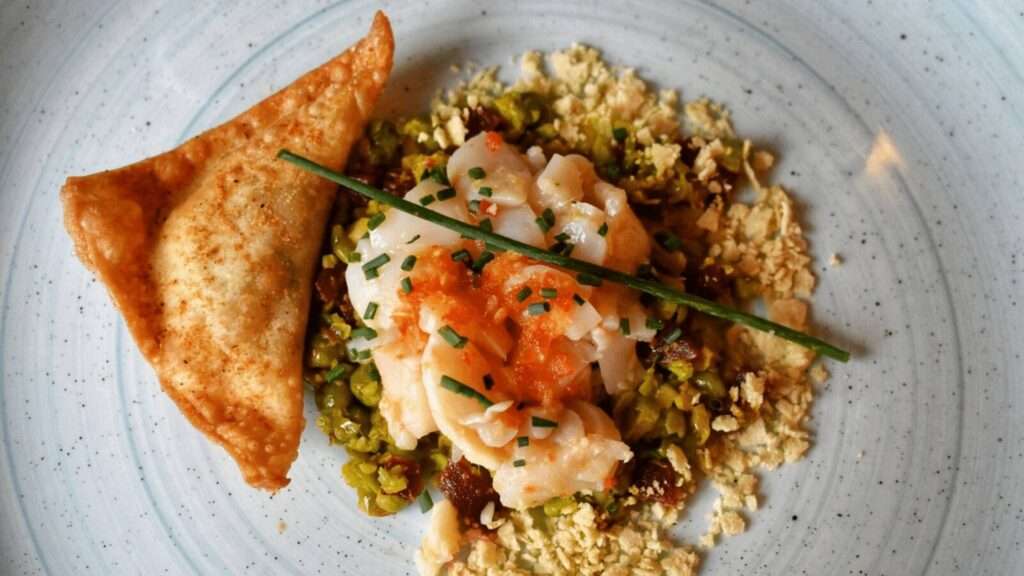
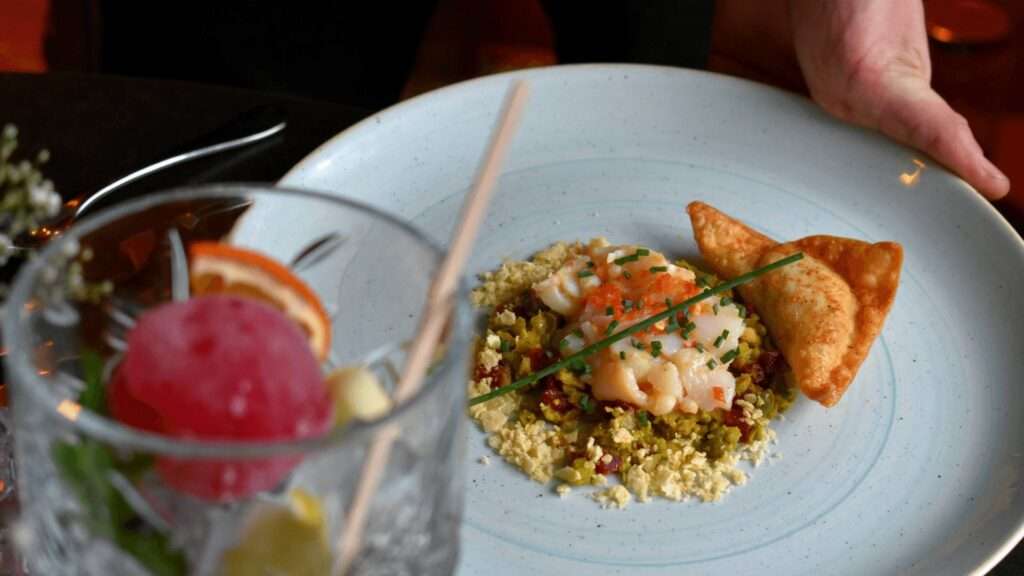
Course: Appetiser
Complexity: Intermediate
Preparation Time: 10 – 15 minutes
Cooking Time: 10 – 15 minutes
Serves: 6 to 8
Ingridients:
Method:
Ingridients:
Method:
Ingridients:
Method:
Our barman Paul has chosen something a little bright for our featured non-alcoholic cocktail with rhubarb as the star of the show. This drink consists of some more very easy to make but very versatile syrups – one using rhubarb and another using mint – both of course can be added to other drinks too!

Make and serve this at home for yourself or ask Paul, our resident Memsahib bartender to create for you. If you try this at home or indeed at Memsahib’s then be sure to tag us in your pics – share with us and tag us on Instagram – @memsahibbar #memsahibathome
Complexity: Easy
Preparation Time: 10 minutes
Drink serves 1, however, the syrups can be stored and serve many!
1. Home-Made Rhubarb Syrup (1L)
Ingredients:
Method:
Dice the rhubarb and add to a pan with the sugar. Add the boiling water and simmer on a low heat for 20 minutes. Blend the mixture until creamy and then strain. Once cool, store in the fridge for up to 1 month.
2. Home-Made Rhubarb Syrup (1L)
Ingredients:
Method:
In a heat resistant jug, add sugar to boiling water and stir until it has dissolved. Add the mint and mix. Cool the syrup down and store in the fridge for up to 2 months.
3. The Rhubarb Ripple Cocktail
Ingredients:
Method:
Chill your coupe glass. In a cocktail shaker, add your raspberries and smash gently and then add all the other ingredients in the shaker with ice and shake for 10-15 sec. Fine strain into the glass and serve and perhaps garnish with fresh rhubarb, mint or raspberry.
Let us introduce Hyderabadi Haleem, a much loved dish across Indian sub continent and among travelling Memsahibs.
The root of the dish can be traced back as far as 10th Century Persia where this energy filled semi soup, semi stew consistency porridge would be offered to labourers to keep them energised for a long day of work. As it travelled through the Indian subcontinent and all the way to Bengal it had been adapted by various tribes; sometimes eaten for breakfast, sometimes for lunch and a staple for breaking fast in the evening during Ramadan.
We love this mouth salivating, tummy crunching, flatbread dipping mouthful of heaven on a cold wintery evening which not only fills the belly but brings that extra little warmth in our heart too.
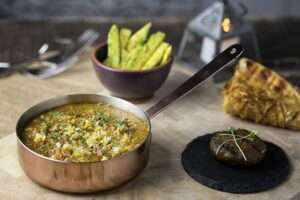
Preparation: 20 minutes
Cook: 190 minutes
Serves 8
Ingredients:
Ingredients:
(Red Chilli, Salt, Coriander, Turmeric, Roasted Cumin powder, Black pepper, Mace, Cardamom,, Paprika, Curry leaf, Nigella, Dehydrated onion, Dried papaya powder, Cane Sugar)
Kedgeree may be known as a well-loved and hearty British breakfast dish but its origins are in fact from Indian cooking where it is referred to as khichri (in Hindi). It was during the British Raj period that it was adopted by the British and altered for their tastes in India and then again amended when brought back across to the British Isles.
Originally, the dish consisted of a mixture of rice, lentils, spice and was always topped with shredded fried onions. One of the oldest references to the dish was recorded by the scholar and explorer Ibn Batuta in AD 1340 in which he writes: ‘’The munj {moon or mung bean} is boiled with rice and then buttered and eaten. This is what they call kishri, and on this dish they breakfast every day.’’
As it grew in popularity with the British in the 19th century, additions of smoked fish i.e kippers came about. However, as new iterations were developed in Britain, especially during the Victorian period, less spices were used, opting for more herbs like parsley or marjoram.
Fast forward to the kedgeree we love to eat now and we can see it has returned to its Indian roots using spices like turmeric to colour the rice a pale yellow, slices of green chilli for heat and those deliciously fragrant and sweet fried onions on top – an incredible garnish that finishes off the dish perfectly.
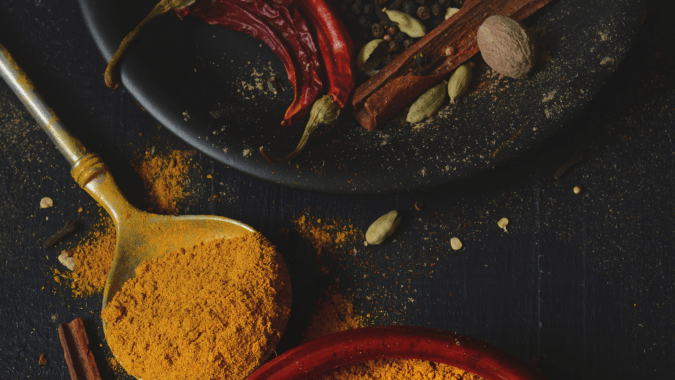
What makes this recipe so versatile is that it really isn’t just limited to being a breakfast dish and it’s not just a dish that needs to be cooked with smoked fish or eggs or even meat for that matter. It’s filling without sitting too heavy, and as intended in the subcontinent, a very humble dish that is perfect to break your fasts with. With Christmas around the corner, we have put together a simple recipe that allows you to use all your leftover protein from Christmas Day and serve up a delicious Boxing Day brunch that not only fills the bellies of your guests but also reduces your carbon footprint, ensuring that the turkey and sausages from your Christmas Day lunch will not go to waste.
Happy cooking!
We would love to see how you have created these dishes at home – please do share with us and tag us on Instagram – @memsahibbar #memsahibathome
Course: Breakfast
Complexity: Intermediate
Preparation Time: 10 – 15 minutes
Cooking Time: 40 – 45minutes
Serves: 4 to 6
Ingredients:
3 large onions sliced
1 tbsp grated garlic
1 tbsp grated ginger
2 tbsp medium curry powder
Dry whole spices (2 cardamoms, 2 cloves, 1 bay leaf and 1 inch of cinnamon)
2 green chillies, cut into halves
Pinch of saffron
1 tbsp salt or to taste
Ingredients:
1 ½ cup red lentils
1 ½ cup basmati rice
2 cups of leftover cooked turkey meat
1 cup of leftover cooked sausages, chopped
2 tbsp raisins and sultanas – soaked and strained
2 tbsp ghee or clarified butter
2 tbsp rapeseed oil
700ml of homemade stock (recipe below) or chicken stock
Method:
Method:
If a man comes into a victualing house to drink punch, he may demand one quart of good Goa Arak, half a pound of sugar and half a pint of good lime water; and make his own punch. If the bowl is not marked with the clerk of the market seal, then the bowl may be freely broken without paying anything either for the bowl or punch.
Order book of the Bombay Government, August 13, 1694
The Bombay Presidency Punch owes its name to General Sir John Gayer, who penned the recipe in 1694. Gayer was the East India Company’s governor of the “Bombay Presidency” – as the trading company’s possessions in that part of India were called.
The punch was later discovered by sailors and merchants who travelled to the area looking to open up trade routes for gold and nutmeg. They mixed the locally produced spirit with citrus, sugar, and spices to create “punch” (the name might be derived from the Hindi word paantsch, which means “five” – the number of ingredients in a typical punch of that time).
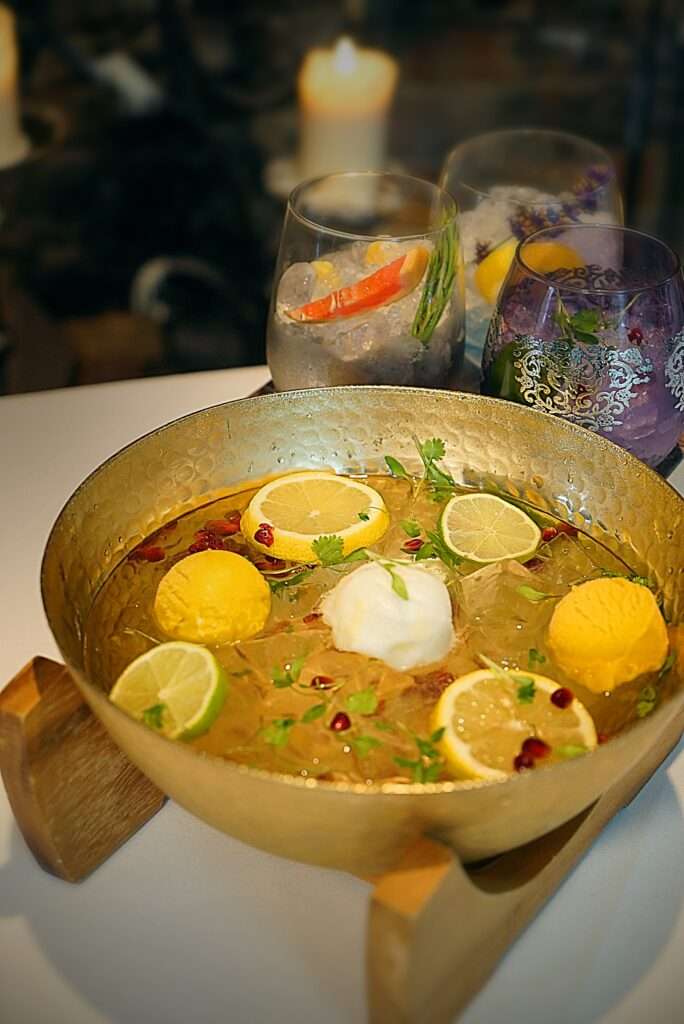
with bay leaf and cinnamon reduction
Course: Beverage
Complexity: Easy but Challenging in parts
Preparation Time 15 to 20 minutes
Cooking Time:30 to 40 minutes
Serves:6 to 10
Ingredients
Method
To Make punch Ingredients:
Ingredients
Method:
Ingredients for garnishing punch cups:
Put all the ingredients in a punch cup or highball glass accordingly and the present it with the punch bowl.
In 2014 when I first went into the kitchen with a hope to cook and serve, I had no idea I would be a chef that would end up presenting a masterclass at the Cheltenham Food and Drink Festival. It was a great pleasure meeting you all, and as promised, the recipes and cooking techniques for the Prawn Kofta and Prawn Kofta Curry are below for you to enjoy cooking the dishes that I presented to you, in your own kitchen, at home.
In 2020, after six years of growing East India Cafe in Cheltenham, we decided to sell and concentrate on Memsahib Gin and Tea Bar as well as other ventures. Rick Stein once said that ‘’cuisine reflects the culture’’ and that it is imperative that we now know what we eat and how we eat. For us, as chefs, the provenance of what we consume is crucial. We believe sustainable cooking means sourcing your ingredients ethically and locally, whilst the preparation of it should be centred around not only creating an incredible dish, but doing so whilst producing food with less waste. With the reopening of hospitality in the UK and learning from a very challenging year throughout the pandemic we decided to revise our menu and our food production with sustainability at the heart of what we do.
At Memsahib Gin and Tea Bar, we serve Anglo-Indian cuisine. It’s an amalgamation of Indian, European and Mughal cuisine, which was developed during the British rule in India. However, the way we like to eat nowadays has changed dramatically over the last decade, and with that in mind, we made the whole menu tapas-style dining and called it ‘Memsahib’s Picnic’.
Below are two recipes; one for a snack style Prawn Kofta and another for a curry style Prawn Kofta using a creamy coconut milk. You won’t find sustainably grown local prawns in the UK, and as a chef, we feel terrible to hold a block of shrimp that has travelled six to eight thousand miles to come to our kitchen. However, we believe we have addressed this issue with our Land Ocean Farm project, where we hope to produce white-legged shrimp in a biosecure environment using recirculating aquaculture technology. In a couple of years, you will be able to find Gloucestershire grown prawns in your local shop and being served in restaurants.
Sustainable food production requires education and learning, awareness and overall continuous practice and improvement. We really believe in this ethos at the Memsahib Gin and Tea Bar and also encourage our guests and followers, through our masterclasses, to practise the reduce, reuse and recycle strategy. This allows us to be fully responsible for the products we consume as well as the waste we create. Globally, around a third of all food produced is lost or wasted, which contributes between 8 – 10% of total greenhouse gas emissions. In particular, food waste at home is a huge contributor to our emissions and reducing it can be so powerful in the fight against climate change. I also firmly believe that we can be that much closer to eradicating food poverty if we can achieve zero food waste, and especially so from commercial food production kitchens.
There is enough food for us all – we just need to be mindful in our consumption of it.
Happy cooking!
We would love to see how you have created these dishes at home – please do share with us and tag us on Instagram – @memsahibbar #memsahibathome
Course: Appetiser
Complexity: Easy
Preparation Time: 15 – 20 minutes
Frying Time: 2 to 4 minutes
Serves: 6 to 10
Equipment: Food processor and a frying pan
Ingredients:
Method:
Roll the chillies on your chopping board and then slice them in the middle. Shake them to deseed. Add to the food processor, along with the chopped ginger.
Add all the other ingredients, except for oil, coriander and prawns to the food processor and pulse a few times until it is all mixed and has formed a blended masala type mixture.
Now add the prawns and coriander and pulse again to mix and form a very thick and sticky paste.
Transfer to a bowl and keep in the fridge for around 10 minutes.
After 10 minutes, heat a pan with oil. Once hot, try shallow frying a tester dumpling-sized kofta. Cook until it develops a golden brown colour. Have a taste and if necessary, adjust the seasoning. Then repeat the process with the rest of the mixture.
Alternatively – grease a roasting tray and place your prawn kofta to cook in the oven. Roast at 180 degrees in a preheated oven for 12 to 14 minutes.
Prawn Koftas are always best when served and enjoyed hot! If you decide to roast them, they can be stored in the fridge for two to three days and can be reheated and fried again.
Course: Main
Complexity: Intermediate
Preparation Time: 15 – 20 minutes
Frying Time: 20 to 25 minutes
Serves: 6 to 10
Equipment: Food processor and a medium-sized saucepan
Ingredients:
Method:
Heat the pan and add oil. Fry all of the masala (cardamom, bay leaf, cinnamon and clove) for a minute and a half or until your kitchen smells very aromatic.
Now add onions and saute on medium heat until it becomes medium golden brown – around four to five minutes.
Add the garlic and ginger paste and fry for one to two minutes.
On a very low heat, add all the ground masala (turmeric, Kashmiri chilli powder, coriander powder, cumin powder, garam masala) and cook for 30 seconds.
Add 100ml of water and cook until the oil rises slightly to the top (in Bengali, this process is called koshano, and it’s vital for a good thick consistency to the sauce).
Add tomatoes and 50ml of coconut milk and cook again until once again, the oil rises to the top.
Now add those fried or roasted Prawn Kofta and cover with a lid. Cook on a low heat for two minutes.
Now add the rest of the coconut milk and bring to a boil, then simmer for 20 minutes.
Finish it up by adding a tablespoon of lemon juice and garnish it with a pinch of garam masala on top.
This prawn kofta curry goes well with steamed boiled rice and a little bit of onion and cucumber salad, as well as a hint of chat masala powder to balance all the five flavours together. I’m certainly a believer that curry does in fact taste better the next day so certainly do consider making this Prawn Kofta Curry in a batch and refrigerating or freezing to store. It’s a great way to plan at home and a really efficient way to cook and eat what you need.
This year has been a roller coaster for everyone. But it doesn’t mean that we can’t enjoy our lives anymore. I would say, indeed we can, but in this case we’ll have some help from a good old G&T.
COVID-19 took a lot from us: we can’t go out without a mask, events are cancelled, a lot of things have been moved online, most of us can’t enjoy a meal in the restaurant… And this list just keeps going and seems to never end. In those uncertain times, we need to remember how to relax and stay calm while we’re at home. And who said you can’t enjoy your favourite gin from Memsahib Gin and Tea bar at home? Exactly, no one. It might seem a bit daunting, but trust me, it doesn’t take a lot of effort.
Let’s start with a bit of background: what is gin exactly? Gin is a neutral spirit distilled from something natural like wheat, barley, potatoes or grapes. There are three traditional types of gin: London Dry, Plymouth Gin and Old Tom gin (Craft Gin Club, 2020). Gin can also be flavoured, sloe or even a liquor but all of them are different from traditional types. However, today we’ll need London Dry Gin. Not many people know, but you can infuse gin with anything. Literally anything: tea, veggies, fruits, coffee… and it will taste fantastic.
So, how can we create your homemade gin and make the atmosphere of the bar at home? Think of your favourite flavour (mine is Tropical Mango, so now we’ll work with this). We’ll need a bottle of London Dry Gin, your favourite fruit/tea and 24 hours of patience.
Step 1: Pour 500ml of London Dry Gin into a large jug;
Step 2: Take an empty tea bag and add 1.5 teaspoons of Tropical Mango tea to it;
Step 3: Place the teabag in the jug with gin and leave to infuse for 24 hours.
Once 24 hours have passed, take your favourite glass, fill it with about four medium-sized ice cubes, add a slice of lime and a couple of juniper berries. When this step is done, grab a measuring jigger, pour 35ml of Tropical Mango gin and top it up with a light tonic. If you are not a big fan of tonic, then you can easily replace it with anything you like more: ginger ale, lemonade, juice…
Then savour the tast and enjoy the moment and congratulate yourself on your efforts.

Gin and tea are possibly the most quintessential ‘English’ beverages you can find – especially considering the rise in popularity that gin has gained in recent years. Tea has been a British staple since the 17 th century, having first been discovered in China where it was used for medicinal purposes. Today, many different flavours of tea are available – from English breakfast to green tea and a vast variety of floral teas. Similarly, the recent gin craze has seen the emergence of brand new flavours, ranging from raspberry to lemon drizzle flavoured gins.
Tea is the second most widely enjoyed beverage in the world after water. India is home to the second largest producer of tea, as well as some of the world’s favourite tea varieties including Assam and Darjeeling. It’s suggested that the drinking of tea in India can date as far back as 750 BC, before being re-discovered and commercialised in Britain. Tea production in India began due to the increasing demand of tea from the British. This tea production was positively received and as a result, inspired tea production across wider areas of India, before prospering into the modern day.
According to the fermentation process, there are many different varieties of tea. The tea leaves themselves are known for their nutritional and medicinal properties, providing the body with essential antioxidants whilst increasing metabolism. Tea is also thought to protect the body against cancer and cardiovascular disease. Due to its popularity, health benefits and history in India, we’ve experimented with a range of different tea flavours and properties to provide our guests with a true taste experience.
The popularity of gin, similarly to tea, arose from medicinal purposes. During the British Raj, British soldiers and officials of the East India Company were given gin and tonic. During this time, tonic contained high levels of quinine, a medicine that helped to stave off malaria – and thus, the popular gin and tonic cocktail was born. However, today, this beverage contains much less quinine since it is no longer used for medicinal properties. Gin, an ever-growing popular drink, can be seen on the shelves of many homes across the world, being enjoyed in a variety of ways.
During the British Raj, the Memsahib would create amalgamations of gin and tea, producing innovative recipes that were enjoyed widely. At the Memsahib Gin and Tea Bar, we want to re-create the living room of the Memsahib, serving cocktails and punches akin to those in the Memsahib’s home.
